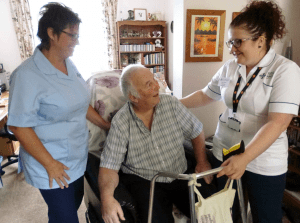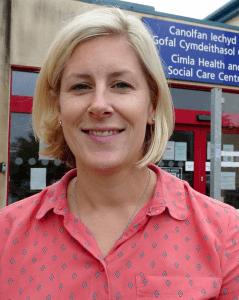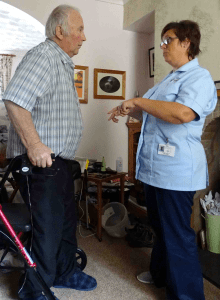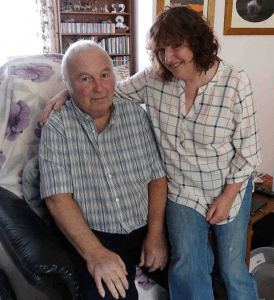Photographer Brian Watkins is home again and getting back on his feet just six months after suffering a heart attack followed by a devastating stroke.
The 72-year-old from Neath is one of the many success stories enjoyed by a community team which supports people to come out of hospital and back to their own homes as quickly as possible.
 Brian Watkins gets a helping hand at home from reablement team assistant practitioner Ceri Joseph (left) and specialist physiotherapist Leanne Walters
Brian Watkins gets a helping hand at home from reablement team assistant practitioner Ceri Joseph (left) and specialist physiotherapist Leanne Walters
Known as the reablement service, it’s part of the Cimla-based Community Resource Team run jointly by ABMU and Neath Port Talbot Council.
Service manager Karen Wright said: “We know people deteriorate the longer they are in a hospital bed so we work hard to get them out of hospital as quickly as possible.
“If we weren’t around, the only option would be a long-term package of care and not everybody needs one. A lot of people just need short-term intervention to help get them back to normal.”
The reablement service is available to anyone aged over 18 from Neath Port Talbot who has, for a variety of reasons, lost their independence.
It does care for some younger people who have a long-term condition or have had an accident or stroke. But the majority are older people – the average client age is 82 – many of whom have been in hospital.
Other referrals come from GPs, social workers, district nurses and from the clients themselves or their families.
 The service was established in the late 1990s with just a handful of staff.
The service was established in the late 1990s with just a handful of staff.
Since then it has grown considerably and now comprises occupational therapists, physiotherapists, speech and language therapists, dietitians and around 60 support workers as well as other essential staff.
Karen (left) explained: “The therapists will look at the patient, see how they are moving and walking and how they are functioning with washing and dressing and meal preparation.
“The dietitian look at nutrition and the SLTs look if there are any swallowing or communication difficulties.
“They then create a therapy plan and the support workers will deliver that plan.
“They will go into the person’s home up to four times a day, and help them to do things for themselves, like washing and dressing and taking their medication.
“We can provide intervention for up to six weeks. That gives us a really good insight into the individual’s needs.
“Of course not everyone becomes independent after a period of reablement. Some people do need ongoing care.
“But what we’re able to do is measure that need and get them to be as independent as they can be by only giving them the care for the things they can’t do themselves.”
Karen said preventing the start of long-term care and support packages was actually beneficial for patients.
“Evidence tells us that once you start having a long-term care and support package, you will become more and more dependent on it.
“The only way it will go is up. Your care package will gradually increase as you become less able. So keeping people away from that keeps them independent, stable and at home for longer.”
The team can also provide a residential reablement service – transitional support for people who are not so unwell that they need to be in hospital but are not quite ready to go home either.
It has 11 beds at Plas Bryn Rhosyn, a residential home in Caewern, Neath, where these patients can spend up to six weeks for therapy, which may include improving movement and learning new techniques for everyday tasks.
They can stay there for up to six weeks before going home for a further six weeks of community rehabilitation if needed.
Brian spent time in hospital and in Plas Bryn Rhosyn before returning to his Neath home where he lives with partner Anne.
Right: Brian gets some advice from Ceri Joseph
He had a heart attack in March this year. Doctors decided a bypass was the best option, only for Brian to have a stroke during surgery.
He had very little speech and lost all feeling and movement in his left side. He was unable to walk and had to use a wheelchair.
After months being cared for in hospital followed by a stay in Plas Bryn Rhosyn, Brian is slowly getting back on his feet and, with reablement support, has been living at home full-time for the last month.
Brian said: “Without the reablement team I would still be in bed. You can tell that they’re not just doing a job and that they genuinely care. They are my friends.”
Last year the team’s work avoided 606 hospital bed days, with an estimated saving of £66,660, and led to a reduction of almost 3,000 domiciliary care hours, saving £44,599 in weekly care costs.
 Since the team last expanded in 2014, admissions to residential care homes have also reduced by 44 per cent.
Since the team last expanded in 2014, admissions to residential care homes have also reduced by 44 per cent.
But for the staff involved it’s about much more than facts and figures.
Brian with partner Anne
Karen said: “It’s very rewarding to help people get to where they want to be.
“You talk to people and that’s what they want. They want to be able to get to the loo themselves, they want to be able to feed themselves and generally do for themselves.
“People don’t want to be reliant on family or carers. It’s the little things that matter most to us, like sleeping upstairs in your own bed instead of having to sleep in a bed downstairs.”
Help keep news FREE for our readers
Supporting your local community newspaper/online news outlet is crucial now more than ever. If you believe in independent journalism, then consider making a valuable contribution by making a one-time or monthly donation. We operate in rural areas where providing unbiased news can be challenging. Read More About Supporting The West Wales Chronicle
























